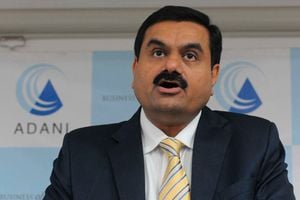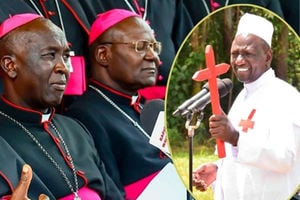
President William Ruto delivers the State of the Nation address at Parliament Buildings in Nairobi on November 21, 2024.
Critics of President William Ruto have accused him of running a one-man show administration, centralising key decisions around him and using the State machinery to target political opponents.
This comes at the end of a week in which the President gave his State of the Nation address in Parliament. The highlight was the shock cancellation of the controversial deals involving the Adani Group, an Indian conglomerate —one proposing to run the Jomo Kenyatta International Airport and the other a power contract signed with the Kenya Electricity Generating Company. Critics see echoes of the withdrawal of the Finance Act 2924 after Gen Z protests to point out another flaw: both had been approved by the Cabinet and MPs on his urging against sustained public pressure to drop them. They were dropped too late and abruptly, leaving key officials and political allies with egg on their faces.
While Dr Ruto’s allies have pointed to these decisions to show he listens and responds to the concerns of Kenyans, others say he ignores cries and only acts when cornered. In the Finance Act 2024 case, it was the protests that triggered a reaction while in the Indian multinational’s deals, the indictment of billionaire Gautam Adani and his associates on bribery claims by the United States Department of Justice left the President with little wriggle room.
Now, political pundits argue that President Ruto has a choice of pushing on with attempts to unite and develop the country through the difficult route of one-man show or the easier one of carrying everyone along.
Bulldozing issues
“Generally no one raises issues with you as a person but of concern is your government’s love for bulldozing issues and sidestepping the rule of law and public participation while implementing projects, especially those of huge tendering,” Busia Senator Okiya Omtatah, a firm critic of the President, said.
He said Dr Ruto has been vocal and determined to amass a monopoly of decision-making.
“We only demand accountability, transparency and credibility in all aspects of governance. The President has cancelled Finance Bill 2024 and now the Adani deals months after he had earlier ignored credible concerns,” said Mr Omtatah, who was involved in cases challenging the tax law as well as the Adani deals.
But Nyeri Senator Wahome Wamatinga defended President Ruto saying “his declared intentions and goals appear well-meaning and transformative”.
He said the President made it clear in his address on Thursday that “he remains the gentleman he is a development-conscious leader we believe in”.
Dr Ruto’s economic adviser Moses Kuria speaking in Murang’a on Saturday during the burial of nominated MCA Mark Wainaina, asked Kenyans to allow the President time to implement his plan, as they will have a chance for an audit in 2027.
“We are in President Ruto’s government to stay for that is the right thing to do...He remains our ship steward till 2027 when we will come back to you for rating. Politics aside, President Ruto is progressive-minded,” he said.
On Saturday, Kapseret MP Oscar Sudi told the Sunday Nation that President Ruto was a listening man, citing the recent flurry of admonitions by the church and the clergy, led by the Catholic Church whose bishops issued a stinging statement warning against what they said was a growing culture of lies.
Reconciliatory note
The government issued a flurry of statements in reply to the bishops’ concerns, and President Ruto attended church events for three consecutive days, culminating in a Sh5.6 million donation to Nairobi’s Soweto Catholic Church that Archbishop Philip Anyolo later said would be returned.
“We have since struck a reconciliatory note with the clergy, some of us have apologised and we want to cease negative emotions and unite for nation-building. President Ruto cannot deliberately set out to wrong people...but in this political space of propaganda, malice and backbiting we find ourselves mired in non-issues,” said Mr Sudi.
On his part, Jubilee Party Secretary-General Jeremiah Kioni says President Ruto’s major undoing is “his audacity to centralise everything around him and playing the one-stop shop for all solutions, including uniting the country”.
Mr Kioni said the President loves personalising things. He also argues against an earlier plan by Dr Ruto’s United Democratic Alliance (UDA) for the merging of parties in the Kenya Kwanza Alliance to form a mega-party for the 2027 elections.
He said strong multiparty democracy is a pillar of the Vision 2030 blueprint and political parties should be encouraged to grow.
Calvine Otieno of the Bunge la Mwananchi said: “We are better off discussing development to unite us. If we all noted that quality of life is improving, we can access basic needs as a matter of right and generally purchasing power is there, we wouldn’t mind pledging love for the leader behind the transformation.”
He says Dr Ruto wants to unite Kenya through promises of if-and-when he gets a second term even when there are three years before his current contract expires in 2027.
President Ruto, in his State of the Nation address, seemed to acknowledge questions on the policy directions of his government and whether citizens were adequately involved.
“There are discussions about whether leaders understand the pain, hardship and struggles endured by countless citizens every day as they strive to make ends meet, and whether the government is doing anything about it.
“Similarly, many struggling Kenyans impatiently wonder when real money will get into their pockets, and when the promised jobs they deserve will become a reality,” he told Kenyans.
Then he said, poignantly: “Another more direct question that emerges now and then, is whether public policy under this administration is in furtherance of service delivery to citizens or just in aid of political strategy.”
Self-aggrandisement trap
Others argue that Dr Ruto’s major fallacy is holding that if all Kenyans submitted to him, loved him and gave him a second term then the country would be united.
“Our President should not fall into the self-aggrandisement trap of believing when all are his praise and worship team then the country is united. It is the pride of belonging and entitlement to the development of the motherland that should unite us,” says Murang’a diocese Catholic leader Maria Wainaina.
Safina Deputy Party leader Willis Otieno supports this view.
“The manner and rate at which he steps in to unilaterally cancel decisions and declarations of his Cabinet and loyalists, how he talks of his plans for the nation and how he punishes divergent views are cited as evidence of what exactly ails his administration,” he says.
Mr Otieno says after the President had mobilised Parliament to pass the Finance Bill 2024 as well as having his cabinet endorse Adani deals, he later came out without warning to cancel the two issues.
He says the President comes out strongly as a politician, who for his survival and desperation to be seen as a man of the people, will throw everyone under the bus for his survival if needed. Safina party boss said Dr Ruto in cancelling the Adani deals forgot the one involving the Social Health Insurance Fund, which is also linked to the Indian multinational.
"Merely rescinding the Adani Group agreements involving Jomo Kenyatta International Airport (JKIA) and in the energy sector is insufficient. Adani's entanglement in Social Health Authority remains a glaring concern. President Ruto must act decisively and annul this pernicious deal without delay," he said.
Another criticism is the president’s perceived know-it-all stance.
"Our president is fond of speaking in the ‘first person’ about plans and destiny for the country. He is mostly heard talking of ‘my government, I have a plan, I know where I want to take this country, I will succeed’ — in a manner that makes him come out as a man who does not value teamwork and public participation," says musician Ben Githae, known for his political songs.
Political analyst Harman Manyora said the Ruto presidency has run into trouble for the perceived use of state machinery to whip political dissent to submission.
"How Rigathi Gachagua was hounded out of office as Deputy President sent chills down many spines. The speed and determination that was exerted in removing him from office depicted total intolerance. A presidency exhibiting such ruthlessness to an ally whose charges never came out clearly disintegrates more than it unites," he said.
The president is also accused of executing divide-and-rule tactics to gain total control.
But political scientist Mr Gasper Odhiambo says there is nothing wrong in so doing "only that it needs moderation".
He said in President Ruto's case, he comes out as a man who goes for numbers to help him do the wrong things.
"It is in numbers that the president has pushed through oppressive taxes, hound people out of office, or support him when he denies this country has cases of abductions, extrajudicial killings, enforced disappearances and security-driven persecutions," he said.
The president is also accused by a cross-section of the mainstream clergy of using state resources to even woo the church, organisations and various groupings to buy loyalty.
"This is a culture of tokenism...The money he seeks to use for that purpose can be channelled to programmes of national good. You cannot tell us that there is no money for maternal care but you have millions to dish out in churches as offertory. That is a poor approach of uniting the faithful," said Rev Edward Buri of the Presbyterian Church of East Africa, Embakasi, Nairobi.
Protestant Archbishop Raphael Kituva says even the push for unity must not be merely to ensure the loyalty of a small group.
"We end up having a government united in racketeering and fighting corruption becomes impossible since the thieves are friends, spouses and relatives," he said.
The Apostolic Council of the Akorino faith through Secretary General Prince Macharia said the Ruto administration must work hard to address the discontent.
And in the gloom, Dr Ruto critics say, lies some hope that the president might find that Damascus moment in his remaining tenure and start taking more advice than he portends to give.
During his State of the Nation address on Thursday, the president asserted that he has learnt that listening is a full-time occupation of leadership and that all questions asked by the people must be answered thoroughly and in full.
"We have learnt never to take anything for granted, and make every effort to carry all our people along with us in our pursuit of our transformation," he said as he went ahead to announce the cancellation of Adani's shady deals.
Kipipiri MP Wanjiku Muhia thinks cancelling the Adani deals should pave the way for more action.
"Next we hope our police will be brought back from Haiti," she said.











